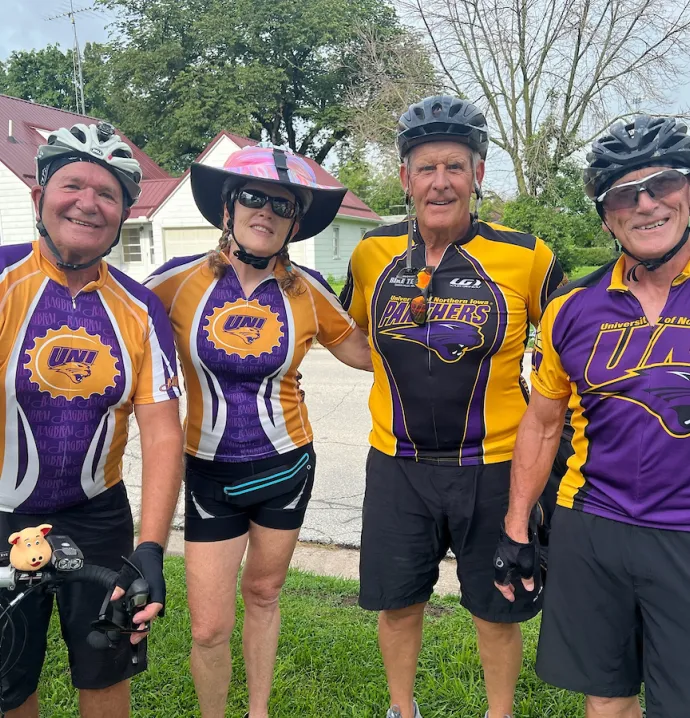School-Based Mental Health Initiative Wins Nearly $375,000 in Grant Funding
School-Based Mental Health Initiative Wins Nearly $375,000 in Grant Funding
Two recent grants are bolstering the University of Northern Iowa’s leadership role in supporting Iowa K-12 schools.
UNI’s school psychology program has received a three-year $327,171 grant through an anonymous donor to expand applied research into a new model for increasing access to mental health services in rural schools. A separate $47,567 grant through the West Des Moines-based Telligen Community Initiative will support a telehealth component of the program offered through UNI’s social work, school counseling and mental health counseling programs, in addition to school psychology.
“UNI is the only Iowa university with a nationally accredited school psychology, a school counseling program and a social work program,” said Nicole Skaar, associate professor & coordinator for the UNI school psychology program. “So we’re in a unique position to bring this interdisciplinary approach to addressing and solving the issues around mental health in our state’s schools. We’re grateful to our funders for recognizing the importance of this work and helping us respond to these needs.”
The grant will expand Skaar’s “system-level” partnership with North Mahaska Schools which encompasses three tiers of mental health services ranging from broad classroom instruction for all students to targeted, individualized counseling. A school-wide screening periodically assesses students’ well-being and matches them with services they need. The grant also funds the costs of replicating the work in Wapello Schools and piloting an emotional support program for teachers and staff.
“The goal is to serve as many kids as possible and to build capacity within the system to really address mental health across the entire school,” Skaar said. “So we’re providing social work services for individual students who are really struggling at that intensive level, but also recognizing that not every student needs individual therapy – some just need check-ins with trusted adults, help building peer relationships and those kinds of things. And so we built those structures and we’re measuring our progress against best-practice indicators.”
Angela Livezy, superintendent of North Mahaska Schools, said the district is seeing the benefits of the partnership with UNI.
“The data shows that we have more students who are feeling like they are connected to school, and they have good supports in place,” Livezy explained. “And in the screener, we are showing less and less students that need significant interventions. I feel like what we have in place is really working.”
Since the program was established in 2017, a collaboration with the Great Prairie Area Education Agency (AEA), whose service area includes North Mahaska and Wapello Schools, enables the district to buy out a portion of an AEA social worker’s time to provide direct services to students. That innovative model has since spread to other Iowa AEAs as a means of increasing access to school-based mental health care.
Skaar said the Telligen-funded telehealth component is a “win-win.” The initiative increases counseling resources for participating schools, all in rural districts in southeast Iowa, while providing UNI graduate students with practical experience offering weekly therapy for students under the supervision of UNI faculty.
“Due to the shortage and wait times for mental health services, we were curious if the telehealth model would be useful and effective,” said Darcie Davis-Gage, program coordinator and associate professor of counseling. “This grant allows us to provide these opportunities for UNI students, and to study this model to create frameworks to embed this in training programs at other universities.”
Youth Mental Health a ‘Dire Situation’
Post-covid mental health concerns are continuing to have profound impacts on Iowa schools, Skaar said. She pointed to the Iowa Youth Survey, a poll conducted every other year that gathers responses from students in grades six, eight and 11 on a range of topics including their wellbeing.
The 2021 survey showed troubling increases in mental health risk behaviors over previous years: one in 10 student respondents reported having a plan to commit suicide within the past year, an increase of 37% in the past decade, and one in 20 respondents stated they attempted suicide in the last year.
“That comes out to one to two students in every Iowa classroom – every Iowa classroom – that have made an attempt to end their life,” Skaar said. “That’s how dire this situation is.”
Further, a shortage of mental health professionals is hindering efforts to provide care, especially in rural areas where community-based providers are less concentrated. Skaar has previously spoken to Congress about the need for more school-based providers.
“School-based psychologists and counselors – we’re about meeting students where they are and reducing barriers for their families,” Skaar explained. “Iowa’s a rural state, and so there aren't always therapists available in the town where the district is located. Parents may have to pick their kids up from school and take them 40 minutes away.” That is a “huge barrier” that can impact parents’ standing at their job, not to mention taking students away from instruction, Skaar added.
School-Based Solutions
With anxiety and depression among youth on the rise, Iowa’s school leaders are desperate for effective approaches to help struggling students. Several of the schools Skaar is working with have experienced student suicide or other forms of tragedies within their district.
Despite disruptions from COVID clouding the full picture of the data, the partnership with North Mahaska Schools is seeing promising early results, Skaar said. Eighty-one students who likely would not have received counseling services have benefited from the program. More than half have seen marked improvements, and all have remained in school and on track to graduate.
Early results of the telehealth program with the school districts of Fairfield, Keokuk, Albia and Davis County are also positive.
“I'm excited anytime that I get to work with schools on building and enhancing capacity to provide mental health services,” Skaar reflected. “This type of system-level change takes time … and it’s a learning process. The trajectory my work has taken has been because I learned from those districts, I'm out there working with them and listening to what’s needed.”




